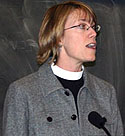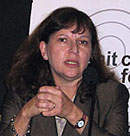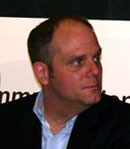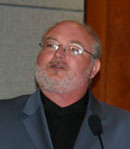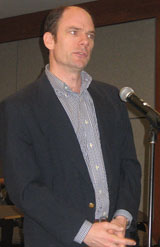| Evangelicals and the Media |
|||||
|
American Evangelicals have a long history of engagement with the media, dating back to the Great Awakening of the late eighteenth century. Today Evangelical groups are active in all media, from the Internet and cellular telephones to print journalism, broadcasting, film, and multi-media entertainment. This forum convenes speakers from the academy and Evangelical community to discuss the social and political impact of the evangelical movement's use of media technologies. Gary Schneeberger is special assistant for media relations to Focus on the Family founder and chairman James Dobson. Schneeberger oversees the internal and external media efforts of the international evangelical ministry's Government and Public Policy Division as senior director of the radio program Family News in Focus, daily email service CitizenLink and Citizen magazine. Jon Walker is a communications consultant for Rick Warren and Purpose Driven Life ministries, and has served as pastor of strategic communications for Saddleback Church and vice president of story for Purpose Driven Initiatives. He is founding editor of Rick Warren’s Ministry ToolBox and the principal author for a book on Christian community, Better Together. Moderator: The Rev. Amy McCreath is Episcopal chaplain and coordinator of the Technology and Culture Forum at MIT. A podcast of Evangelicals and the Media is now available from Comparative Media Studies. A webcast of Evangelicals and the Media is now available from MIT World. [this is an edited summary, not a verbatim transcript] by Greg Peverill-Conti and Marie Thibault
The Reverend Amy McCreath, who moderated the event, pointed to the archives of the Technology and Culture Forum which she coordinates. From its inception in 1964 until the late 1990s, there were no events that included the word “evil” in the title, but since then, there have been several. In the 1980s the term "evil" would have sounded out of place at MIT, where it is now a regular part of public discourse. She attributes this change to the growing influence of the Evangelical movement through their persistent, well-funded, and innovative use of the media. The first presentation was from Diane Winston. She offered a historical perspective and started with a provocative premise: that for the past 250 years, Evangelicals have driven the use of most mass media innovation in the country. They have been the early adopters of technology that was then taken up by the rest of society. From the 1740s though the middle of the nineteenth century, most Americans were Evangelicals. They followed the Biblical imperative to go into the world and preach and hoped that by sharing their faith others would follow. It is this belief that makes spreading the Word so important. It also led to a keen appreciation of the media.
In the 1740s, George Whitfield was the first “trans Atlantic rock star,” holding outdoor revivals that would attract as many as 30,000 people. Whitfield was an astute marketer and promoter. A friend of Benjamin Franklin, they shared an interest in the role of communications as a tool for improving life – even as they disagreed on the value of religion. Whitfield was alive during a time when most media was local; but he crossed geographical borders and societal boundaries – tying the country together through his savvy use of the media. He was the first modern religious celebrity. In 1813, Sam Mills graduated from the Andover Seminary. As he traveled the more remote parts of the country he was dismayed by the lack of Bibles. In 1815, he helped to form the American Bible Society (ABS) – a group dedicated to saving souls by printing a Bible for every American. To accomplish this, the ABS turned to technology – steam-driven presses, machine-made paper, etc. – in ways that far outstripped the commercial publishing industry. In 1833, Harper Brothers bought its first steam-powered press. In comparison, the ABS had 16 in 1829. By 1829, the ABS had the capacity to put a Bible in every hand. Although they had the capacity, the distribution system eventually broke down – especially in the far West. Mills and the ABS saw their efforts as a failure, though from it seems like an amazing feat from a modern perspective. In the early 20th century Aimee Semple McPherson traveled the country, preaching in her Bible car. In 1923 she settled in LA and created Angelus Temple. With seating for 5,000, Sister Aimee kept it full by attracting a secular audience. Her services were full of popular culture – music, shows, and even motorcycles. McPherson used media in new ways. She was the first woman to broadcast a sermon, had her own newspapers and magazine, and in 1924 became the first woman to own a broadcast license. At the time of her death in 1944, she had purchased land to create a TV station. Many secular Americans have a perception that Evangelicals are somehow less sophisticated than other people. This is a false perception. Evangelicals have harnessed the power of the media very effectively. It would also be a mistake to believe that financial gain has been the sole reason for their use of the media (although it has generated great wealth) – spreading God’s Word has always been at the root of this use.
Gary Schneeberger spoke next. A self-avowed “rabid right-winger,” he admitted to having something in common with many liberals – being called a "moron" by Anne Coulter. Schneeberger started by giving some history of Focus on the Family. The first radio show was 30 years ago, on March 26, 1976. It offered (as does the organization’s online activities) Bible-based advice and information. That same radio program now reaches millions. Schneeberger attributed the organization’s growth and success to its use of media and founder Jim Dobson’s communication skills. Dobson started as a child psychologist. He’d written a book, Dare to Discipline. While traveling the country promoting the book he came to believe that the family was in crisis and that society wasn’t helping. He felt “called of the Lord” to do something about it and started Focus on the Family. When conservatives talk about media bias, Schneeberger acknowledged that conservatives’ accusations of media bias do not extend to radio. Even before the current crop of conservative commentators, Dobson was on the air – with Bible-based advice on improving family life. His program caught on not by telling Bible stories – but by having real people on the program telling their stories. It has been the emotional connection that has inspired people to want more. That “more” has taken the form of additional radio programs, books, magazines, and television. Technology has driven much of this diversification. That continues through the organization’s Web site, Focus on the Family podcasts, and current thinking about on-demand, cell phones, etc. as tools to put their content into new channels. Schneeberger wanted to stress that the technology is secondary to their mission to provide truth, heart, and hope for families. It is their adherence to their mission that explains the continuing impact of Focus on the Family. He illustrated that impact by reading a letter from a man in China that said, “He [Dobson] made our life exciting and rewarding.” According to Schneeberger, public policy is only about six percent of Focus on the Family’s activities – yet it gets most of the media attention. He pointed out that Carter was the first president that Dobson worked with; but that his work on the Attorney General’s Commission on Pornography during the Reagan administration led to a greater involvement in public policy. That involvement included expanded communication, the evolution of media outlets and news channels that allow Focus on the Family’s constituents to connect with lawmakers and opinion leaders. The organization’s communications are designed with its audiences in mind – Dobson will talk about a bill in Congress and encourage people to express their opinion. Focus on the Family provides the tools for people to express their opinions, Schneeberger said. For example, CitizenLink (a daily e-mail) allows people to contact politicians and policy makers with the click of a mouse. When they do, Schneeberger contends, it isn’t Focus on the Family that is flexing its muscles, it is the constituents. Focus on the Family, through its media and technology, is the “Bowflex” that helps them stay in shape. Jon Walker, a long time associate of Rick Warren, was the final presenter. His focus was on what churches are doing with media – from local to global to “glocal” – and how that is changing the way they operate and communicate. At Rick Warren’s Saddleback Church, services include a number of jumbotrons. They noticed that people watched the screens even though Warren was there in person. This led to new uses for video and the creation of “venues” – thematic worship spaces (rock, gospel, Polynesian, etc.) – that can exist separately and simultaneously. The common elements of the service appear on screen (time-shifted, if need be) while unique elements occur live. This idea is being extended beyond Saddleback to provide service elements to remote locations. It’s allowing churches to brand themselves and attract members based on reputation rather than proximity. Time-shifted content and Webcasts are also a growing phenomenon – with small groups meeting to listen to services.
Other activities at Saddleback include the use of RSS and the ability to cater to many small, focused groups through the Web site. In addition, the church is using an electronic bulletin to reach its 22,000 members and is no longer doing paper mailings. Some of these advances are resulting in the creation of lots of content and have led to media licensing opportunities. Nooma is an example of paid content for ministers – videos, PowerPoint templates, etc. In some cases, missionary work is being funded by selling content. In all cases, the use of media is based on supporting and promoting the “Great Commandment” (love thy neighbor as thyself) and the “Great Commission” (to spread the faith to the entire world) in order to create purpose driven churches all over the world connected by technology. Rick Warren’s contribution to this has been the book series, The Purpose Driven Life, associated ministerial resources (40 Days of Purpose and 40 Days of Community), a number of DVDs and a Web site. Walker showed several examples of sites and communities that subscribed to the “purpose driven” ideal. One thing that concerns Walker is the way that Christian media is marketed – especially when it becomes too like consumer marketing. The risk, he said, is when the channel becomes more important than the content. Discussion Question: What is Focus on Family doing about global warming? Schneeberger: Dobson acknowledges that the earth might have gone up by a degree in the last 100 years – but that the science is not conclusive. They feel that the organization should focus on things that members agree on – sanctity of life, the definition of marriage, etc. Comment: One element lacking from your comments was a feeling of spirituality. Schneeberger: The focus of this forum was media – not spirituality. Ninety four percent of what Focus on the Family does is spiritual. The use of technology is to help people establish a personal relationship with Jesus. Walker: Technology is being used in support of the Great Commandment and Great Commission in order to help people reach their spiritual goals and to grow as a Christian community Question: To what would you attribute the growth of Evangelicalism? Can you place that growth and the use of digital media into context? Walker: There are a number of factors behind the growth of Purpose Driven churches. Warren figured out how to teach churches this model and to help them see where their churches were going. Part of Warren’s success was his Southern Baptist roots combined with his Southern California lifestyle and a willingness to accept all denominations. Winston: Evangelicals have always pushed the boundaries of media and been willing to adopt elements of the secular culture. A related question is the role of the media in how we think about the role of religion in our life. That is more of a question for Henry [Jenkins] and other media theorists; but it needs to be considered. Question: It was interesting to hear about branded churches, when, at the same time we are seeing greater diversity in other spheres. What is the role and place of dissent in these organizations? Walker: There are all kinds of dissent but they are usually presented in less formal settings. Many GenX churches in particular grapple with the theology – they want to have the experience. Externally there are a number of discussions and blogs are a big part of that. Evangelicals just want to be at the table and allowed to speak. Winston: The rise of splintered denominations – which began during the Reformation –continues. One of the more interesting developments is the rise of the emergent churches – these are being founded by younger people who were being groomed for megachurch leadership but who recognized that they wanted to do something different and more immediate. There is change and disagreement across the Evangelical community – but it is often under the radar. McCreath: I hear what you are saying; but the popular perception is that there is one view. Dr. Dobson speaks with one voice and that is how non-Evangelicals hear the Christian community. Walker: That’s a problem with the media. They do a poor job reporting on religion. The media wants to present the Christians as right wing nuts. McCreath: Can you give me examples of disagreement or dissent within your organizations? Schneeberger: Diversity of opinion is not a priority for Focus on the Family – we own the microphone and control what is said, which isn’t that different from any other media. Media consumers need to compare and contrast different opinions. We have a perspective that we want to get out.
Question: Any organization is going to lose members as it grows – are there ways for your members to communicate back up so you can be sure you’re still in touch with them? Schneeberger: We are constantly in touch with our members – we have our own zip code; Dobson reads the constituent reports every day. Maintaining relationships with our members is a priority. Walker: What Focus on the Family does is excellent. It can be risky to use technology to save staff time; but how can you get a dialog? One of the things I wanted to do was create blogs for various ministries, but that hasn’t happened yet. Question: How do you response to the criticism that Christians shouldn’t be involved with politics but should concentrate on spreading the Word? Schneeberger: It’s really a small part of what we do; for some reason, newspapers don’t seem to think that leading people to Christ is a front page story. [Schneeberger read from a letter by Dobson (written 20 years ago) that expressed his ambivalence about getting involved with policy but concluded that it was necessary in order to fulfill the organization’s spiritual mission.] Walker: Evangelicals are not monolithic – look at Southern Baptists – Carter, Clinton, Gingrich. A Christian impact isn’t always bad – a Christian minister pushed hard for the inclusion of the Bill of Rights. Question: When you think about media and new media, how much of it do you think of as spreading the gospel versus serving your constituents? How do the socio-economic factors play into media decisions? Schneeberger: Focus on the Family is an organization that primarily interacts with Christians, so most are aware of the gospel. The content we provide is designed to bring people to Christ or to support them in their relationship with Christ. We tend to stay quiet about some of our activities. Walker: The number one thing we need to ask is how what we are doing is going to help change others’ lives. Changing lives should be the number one thing that we do. We can get caught up in technology – sometimes we need to step back and ask why – why send out text messages of a sentence from a Purpose Driven Life? Schneeberger: Focus on the Family has created the “Truth Project,” a DVD series designed to promote a Christian world view – you can’t buy it, you have to use it in a series of seminars. Moving product doesn’t mean that people’s lives are being enriched. [These final questions were asked as a set and the panelists had limited time to answer.] Question: To what extent can these ministries outlast the personalities behind them? Are there plans for facing the future without the founders? Schneeberger: Yes, there is a plan. Question: What is it about Evangelicals in particular that has lead them to drive the adoption of technology? Winston: It is interesting that the Evangelicals have been so involved. Part of it is the Great Commission and their desire to get the message out. At the same time, many of the mainline churches have been reluctant to get involved with the media. Comment: Our culture is very divided and divisive – there are some that would say that the Evangelicals’ use of the media has contributed to this divisiveness. Schneeberger: We follow Jesus. He didn’t wonder about this, he was hated by many; do we at Focus on the Family wake up wondering how to stamp out divisiveness? No, in the end, the Bible teaches me to stand for things regardless of what others think. Walker: There are some political elements that have gotten into the movement. I believe what the Bible teaches, but I don’t think that kind of division is a bad thing. What we do need to think about and work on is civility. There is a fear that if people don’t stand together that they will fail and in some cases people fear saying that they disagree. Schneeberger: If there’s one thing the media loves to report on it’s when Evangelicals disagree. Walker: The media needs to start having strong discussions about ideas rather than about conflicts between people. --photos by Greg Peverill-Conti and Marie Thibault
|
|||||

